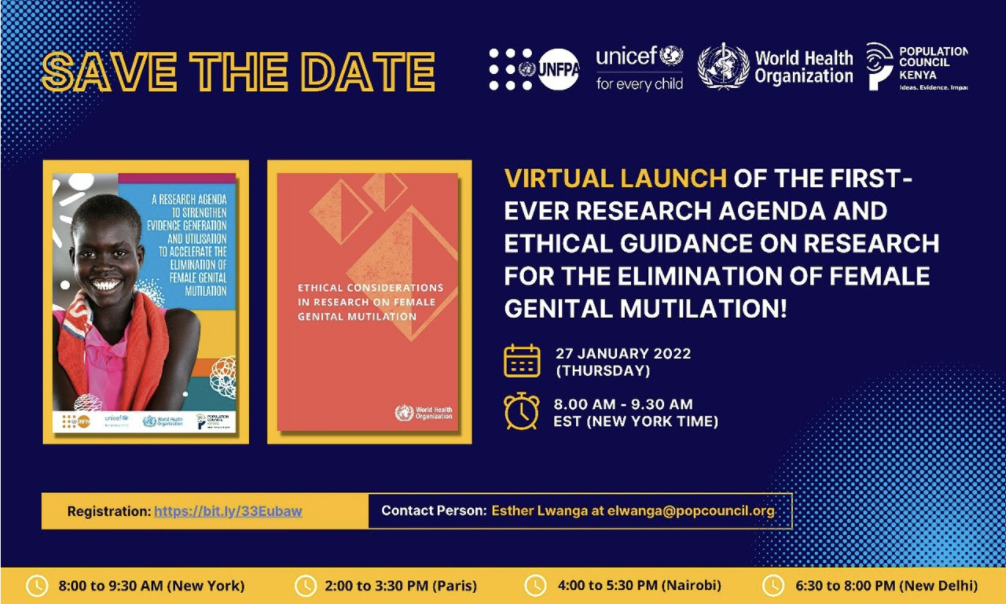By Ellen Ince
On January 27th, I attended the virtual launch of the first-ever Global Research Agenda on the Elimination of Female Genital Mutilation (FGM) and the launch of Ethical Considerations in Research on Female Genital Mutilation. This online event, hosted by UNFPA, UNICEF, WHO, and the Population Council, Kenya.
I immediately felt the buzz of excitement surrounding the launch. It is clear that the Research Agenda will be a critical resource in acting against female genital cutting/mutilation (FGM/C). As panelist Nankali Maksud put it, ‘this is just the beginning. Today is the beginning of a great day but it is not the end of this story.’ She reminded the audience that 4 million girls are at risk of FGM/C every year, and that progress needs to be 10x faster if we are to achieve the UN Sustainable Development Goal of ending FGM/C before 2030. The Research Agenda pinpoints refined research questions and highlights research gaps to bolster progress as we make our way towards that 2030 goal. Research outcomes will then provide evidence to policy makers, with the aim of encouraging them to take action. What struck me the most is the emphasis on community engagement and involvement of survivors as key to finding ethical solutions, which is something so central to Sahiyo’s mission as an organization.
Panelist Dr. Dennis Matanda provided an overview of the research agenda and talked about the process of identifying research priorities. Of the research questions identified, I found the following two questions very thought-provoking:
What intervention approaches are effective in preventing FGM across countries that border each other?
FGM is not an individual or community issue. It is global. Sahiyo believes that FGM/C is a social norm with a variety of justifications for why it is carried out. To tackle FGM/C as a women’s rights issue, we must remain optimistic that social norms, while complex, can change. It must become a social norm for women’s consent to be as highly valued as men’s.
Transforming attitudes concerning FGM/C in a way that is compatible with and sensitive to local culture is fundamental in achieving change. Sahiyo advocates for change whilst respecting other cultures.
How can men and/or boys be effectively engaged as allies of gender equality and ending FGM?
Sahiyo also includes male allies through their Bhaiyo program to take part in action to end FGM/C. Male input is crucial for gender equality to be achieved. They have an important role in promoting women’s rights and their independence. Without their support, gender equality is not possible.
For those who are interested, Sahiyo is launching a new campaign, “Each One, Reach Bhaiyo” with the goal of engaging men in dialogue around female genital cutting. Please keep an eye out on our social media or email This email address is being protected from spambots. You need JavaScript enabled to view it. to learn more!
You can find the other research questions here.
With the Research Agenda identifying research gaps, the Ethical Guidance on Research serves as its companion. The Guidance sets out how to obtain high quality data whilst respecting key ethical principles such as respect for human dignity, autonomy, truth, justice and beneficence. Ethical Guidance is of utmost importance for sensitive topics such as FGM/C. I particularly appreciated the focus on support for the wellbeing of participants and researchers, as well as consent for individual interviews and focus group discussions. The document itself is structured around 3 stages of research: the study design, study implementation, and data analysis and dissemination. You can read the full document here.
I found the panel discussion to be dynamic and informative, in which panelist Salma Abou Hussein spoke about driving change on the ground and Professor Mamadou Balde covered the ethical dilemmas that researchers are likely to face. Dr. Samuel Kimani from ACCAF (Africa Coordinating Centre for Abandonment of FGM/C) emphasised the importance for researchers to bridge the gap between evidence and action, arguing that behind the numbers there are women and girls. Their experience and feelings deserve explicit attention and should be translated into interventions and actions within their communities. This point made me reflect on the role we can all play in ending FGM/C.
It was inspiring to see so many youth activists and students present on the call, taking a firm stance against FGM/C. Young people’s voices are being heard around the globe, giving them power to become drivers of change. I am sure these students found the webinar as enlightening and insightful as I did. This event, and its outputs, mark a major advancement in our work to end FGM/C.

